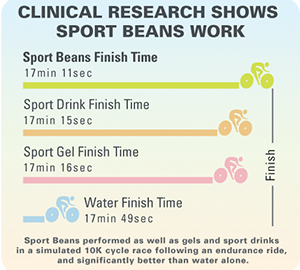Ad Watchdog Weighs In On Jelly Beans “Clinically Proven” To Improve Sports Performance
Jelly beans are delicious, but can they help athletes power through endurance events better than any other random piece of candy? Jelly Belly markets a line of “Sport Beans,” claiming that they’re a better source of energy than gels or sports drinks, and that their superiority has been “clinically proven.” Even if that’s true, should candy be advertised that way?
The National Ad Division is a self-regulation body for the advertising industry, administered by the Council of Better Business Bureaus. Most ads come to their attention through complaints from competitors or consumers, but it’s also been working with the Council for Responsible Nutrition, a supplement industry group, to root out problematic ads for dietary supplements.
 That’s how the NAD came to review the advertising for Jelly Belly’s athlete beans. They are indeed promoted as “[c]linically proven to improve athletic performance,” but what does that mean?
That’s how the NAD came to review the advertising for Jelly Belly’s athlete beans. They are indeed promoted as “[c]linically proven to improve athletic performance,” but what does that mean?
The company did perform clinical tests, pitting athletes who ate Sport Beans against athletes using sports drinks and gels, and one group drinking just water. However, the difference between the carb-popping bean, gel, and sports drink groups was only a few seconds.
A few seconds here and there matter at an elite performance level, and Jelly Belly does sponsor a professional cycling team, but most people buying the product are probably, at best, weekend warriors.
The NAD determined that the “Clinically Proven” claim can stay on the label because the company did prove in a lab that they were slightly more effective than other workout snacks. However, the ad watchdog recommended that Jelly Belly discontinue the “Scientifically Formulated” claim.
“The advertiser did not submit any ingredient studies showing that the amounts of the ingredients in Jelly Belly Sports Bean Energizing Jelly Beans would confer a measurable or optimal performance benefit for endurance athletes,” the NAD wrote in its press release about the reviews.
Maybe half the amount of B vitamins would lead to the best performance. Maybe they should really contain twice as much. There’s still much to discover in the field of jelly bean science.
Jelly Belly countered that “endurance athletes are sophisticated in their understanding of nutritional information,” and that the company doesn’t claim that their product has the perfect amount of each nutrient. It will, however, comply with the recommendation.
Correction: A previous version of this post said that the NAD had asked Jelly Belly to remove the “Clinically Proven” claim from the packaging: the company’s evidence was able to support that claim, and it gets to stay.
Want more consumer news? Visit our parent organization, Consumer Reports, for the latest on scams, recalls, and other consumer issues.

